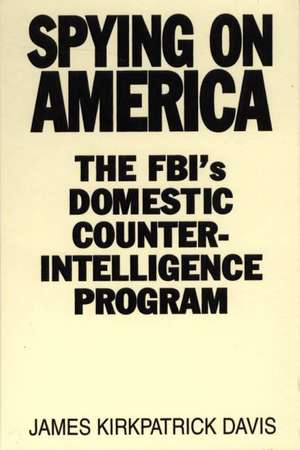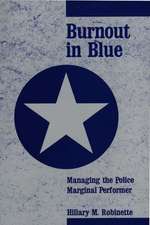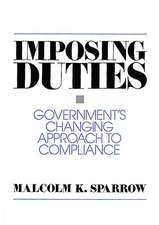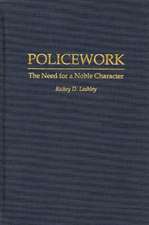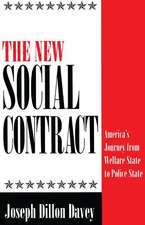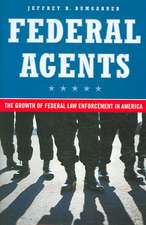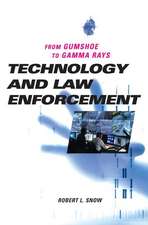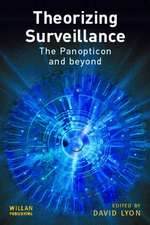Spying on America: The FBI's Domestic Counterintelligence Program
Editat de James Kirkpatrick Davisen Limba Engleză Hardback – 23 feb 1992 – vârsta până la 17 ani
Preț: 354.20 lei
Preț vechi: 433.73 lei
-18% Nou
Puncte Express: 531
Preț estimativ în valută:
67.78€ • 70.68$ • 56.33£
67.78€ • 70.68$ • 56.33£
Carte tipărită la comandă
Livrare economică 20 martie-03 aprilie
Preluare comenzi: 021 569.72.76
Specificații
ISBN-13: 9780275934071
ISBN-10: 0275934071
Pagini: 208
Dimensiuni: 156 x 235 x 20 mm
Greutate: 0.44 kg
Ediția:New.
Editura: Bloomsbury Publishing
Colecția Praeger
Locul publicării:New York, United States
ISBN-10: 0275934071
Pagini: 208
Dimensiuni: 156 x 235 x 20 mm
Greutate: 0.44 kg
Ediția:New.
Editura: Bloomsbury Publishing
Colecția Praeger
Locul publicării:New York, United States
Notă biografică
JAMES KIRKPATRICK DAVIS is President of Davis Advertising Agency Inc. in Kansas City, Missouri. A student of American history for 30 years, Mr. Davis worked directly with Clarence Kelley, former Director of the FBI, as co-author of the book Kelley: The Story of an FBI Director.
Cuprins
The Media Office Raid: Secret FBI Counterintelligence Becomes PublicThe Communist Party, U.S.A. COINTELPROThe Socialist Workers Party COINTELPROThe White Hate Group COINTELPROThe Black Nationalist Hate Group COINTELPROThe New Left COINTELPROThe End of COINTELPROBibliographyIndex
Recenzii
Davis--coauthor of Kelley (1987), the autobiography of former FBI director Clarence M. Kelley--delves into the FBI's secret counterintelligence program (COINTELPRO), which from 1956 to 1971 aimed to stifle dissent among domestic radical groups. J. Edgar Hoover, Davis explains, obtained a vast charter for the FBI to monitor domestic intelligence when FDR signed a special directive just prior to WW II, and managed to get the National Security Council to expand the FBI's portfolio in this arena in 1956. The author documents the Bureau's war against extremist groups of both the left and the right, such as the Communist Party U.S.A., the Socialist Workers Party, the KKK, and the Black Panthers, and shows how Hoover also employed extensive surveillance against New Left organizations like SDS. He pays particular attention to the FBI's virtually obsessive campaign to destroy the reputation of Martin Luther King. The lid was blown on these activities when, in 1971, an illegal break-in occurred at the FBI's Media, Pennsylvania, office. The perpetrators, believed to be anti-Vietnam War activists, proceeded to release to the press stolen classified documents that revealed the FBI's secret operation. To research his text, Davis interviewed FBI agents, former agents, and people who were subject to illegal surveillance or harassment. He recognizes the need for an organization like the FBI, but argues that the Bureau got out of control with COINTELPRO and severely damaged American civil liberties in the process. And Davis notes that, although congressional committees investigated the FBI in the mid-1970's, the Bureau was still committing abuses in the 1980's, particularly against groups opposed to US policy in Central America. A fair-minded and balanced report, backed by extensive research.
The work's merit is that its descriptions of the bureau's brutal methods and of the real people whose lives were affected and some-times destroyed by Hoover's secret policy may shock the undergraduate or general reader into serious consideration of the problem of civil liberties in this country.
Aided by the declassification of many internal FBI documents and his relationship with former director Clarence Kelley, with whom he cowrote Kelley: The Story of an FBI Director, Davis provides information on FBI operations to watch, disrupt, and control the activities of groups (on the left and the right) that were perceived as being dangerous. One theme running through his book is how the FBI was able to use the news media to further its aims. Although these programs were instituted under Franklin D. Roosevelt, the paranoia of the late J. Edgar Hoover was a strong force behind them. Full of interesting details, Davis's book is more focused than Athan Theoharis's similarly titled Spying on Americans: Political Surveillance from Hoover to the Houston Plan, or Joan Jensen's Army Surveillance in America, 1775-1980. Suitable for the intelligence/criminal justice collections of all libraries.
. . . an informative account of the FBI's domestic surveillance activities . . . The author summarizes in individual chapters five COINTELPRO operations, giving clear pictures of the crude but apparently effective techniques used against the American Communist Party, the Socialist Workers' Party, white hate groups such as the Klu Klux Klan, radical African American organizations like the Black Panther Party, and the New Left movement, comprised primarily of antiwar activists.
.a great record on this shameful episode in intelligence history.
The work's merit is that its descriptions of the bureau's brutal methods and of the real people whose lives were affected and some-times destroyed by Hoover's secret policy may shock the undergraduate or general reader into serious consideration of the problem of civil liberties in this country.
Aided by the declassification of many internal FBI documents and his relationship with former director Clarence Kelley, with whom he cowrote Kelley: The Story of an FBI Director, Davis provides information on FBI operations to watch, disrupt, and control the activities of groups (on the left and the right) that were perceived as being dangerous. One theme running through his book is how the FBI was able to use the news media to further its aims. Although these programs were instituted under Franklin D. Roosevelt, the paranoia of the late J. Edgar Hoover was a strong force behind them. Full of interesting details, Davis's book is more focused than Athan Theoharis's similarly titled Spying on Americans: Political Surveillance from Hoover to the Houston Plan, or Joan Jensen's Army Surveillance in America, 1775-1980. Suitable for the intelligence/criminal justice collections of all libraries.
. . . an informative account of the FBI's domestic surveillance activities . . . The author summarizes in individual chapters five COINTELPRO operations, giving clear pictures of the crude but apparently effective techniques used against the American Communist Party, the Socialist Workers' Party, white hate groups such as the Klu Klux Klan, radical African American organizations like the Black Panther Party, and the New Left movement, comprised primarily of antiwar activists.
.a great record on this shameful episode in intelligence history.
